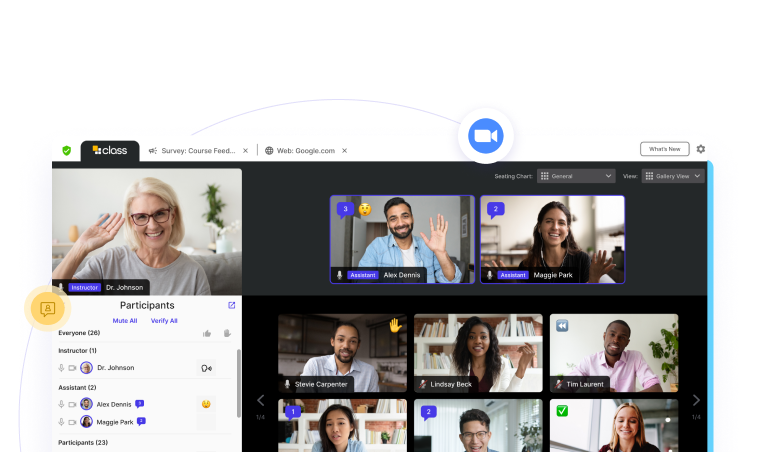
Christy O’Glee works as an Account Executive at Class after spending a decade in education. She is passionate about increasing educational opportunities for K12 students through innovative technology. When not working, she can be found traveling and spending time with her family.

Christy O’Glee works as an Account Executive at Class after spending a decade in education. She is passionate about increasing educational opportunities for K12 students through innovative technology. When not working, she can be found traveling and spending time with her family.

As the future of education continues to evolve, there’s no denying the impact technology is having in and around the classroom. Previous barriers to access are being eliminated. A wider array of remote learning options are now available to students. High-quality education can be provided regardless of location.
Recently, we convened a panel of teachers with varying mixes of in-person and virtual classroom experiences to discuss the future of education. While there are many benefits of online learning, the key focus of this article is to explore the combination of in-person and online classrooms.
With input from our panelists, we’ll explore the concept of combining in-person and virtual classrooms, improved access to resources, development, and other learning opportunities, and how a blended classroom offers new levels of flexibility.
Too often, the idea of in-person teaching and online classrooms are seen as mutually exclusive ideas. The reality, however, is that these modalities can not only coexist, but aid one another for students’ benefits. The advantages of online learning and in-person education are continuing to be seen by districts.
As Samantha Jacobson, an educator at Calcasieu Parish School Board, notes, “It doesn’t have to be fully in-person or fully virtual. There is a way to mix them. And, I think for right now, that’s the future of education.”
In fact, each of our panelists have unique roles with in-person and online classrooms. Hannah Hebert, an educator at Calcasieu Parish School Board, is a full-time virtual educator, but her students may only have a single course each day in a virtual classroom; whereas Arnecia McGlory, an educator at Clayton County Public Schools, reports to a physical building and her students are 100% virtual.
Combining in-person and virtual classrooms doesn’t have to be a cookie-cutter approach, either. School districts can adapt to a customizable balance that works best for their specific needs to obtain the greatest benefits of online learning and in-classroom education.
A hybrid approach to in-person and virtual classrooms can also expand academic opportunities, create improved development resources, and even tap into new experiences.
Melissa Randall, an educator at Eureka Union School District, provides a real-world example, “There’s many times this year where I have been able to get authors to zoom in. And even though I’m fully in-class and I’m with students 100% of the time, face-to-face, there’s things about the virtual or online setting that are really helpful for even a person who’s in class 100% of the time.”
The widened net cast by virtual classrooms isn’t just limited to students, either. One of the advantages of online education is next-level teacher development. Randall laments, “The professional development has been […] back to in-person professional developments—which has been worse, if I’m being totally honest. It’s worse because we just don’t get the same caliber of presenters and education through those in-person professional developments that we could possibly have if they were virtual.”
Jacobson adds that another expanded opportunity online education can provide is “being able to offer college-level classes, fun electives like forensic science, things like that, that are great possibilities for students where they wouldn’t get those classes anywhere else.”
There are even options school districts are considering on the horizon that could change the affordability and availability of life-changing experiences. McGlory proposes, “[Virtual immersive education] could almost be like a study abroad without having to worry about where the funding would come from […] We can go on this field trip while you’re still at home, safe and sound.”
Embracing a hybrid approach to in-person and online classrooms also unleashes an entirely new level of flexibility for learners, educators, families, and more. Randall notes, “Our IEPs and 504s and SSTs and things like that have moved to virtual, which is really great for parents because they can’t always make it in person.”
In addition to added parent/guardian flexibility, Randall has also seen the benefits of online learning show up in other unique ways, adding, “[A hybrid approach is] really nice for students who are absent because […] I have a virtual classroom setup […] and I update it every single day and they can follow along. It’s also nice that, if I have to be absent, I can record a video and they can watch that and […] the sub doesn’t really have to do very much.”
The shift to a hybrid approach does require intentionality. As Hebert points out, “Anything that you can do in an in-person classroom can be done virtually. It just looks different and requires a lot of creativity.” That creativity can pay major dividends to all involved by providing increased flexibility and access.
As the future of education continues to combine both in-person and virtual classrooms, the opportunities that accompany this shift are also going to grow. Jacobson summarizes it effectively, stating, “[The] possibilities are endless. And it’s endless for the students. […] And that should be what education is all about. It should be being able to provide endless opportunities for students.”
Want to discover the totality of our panel’s insights? Check out the full webinar here. Looking to unleash those endless possibilities for your students? Chat with us today. Here at Class, we’re passionate about moving education technology forward to provide increased access to learning.

Christy O’Glee works as an Account Executive at Class after spending a decade in education. She is passionate about increasing educational opportunities for K12 students through innovative technology. When not working, she can be found traveling and spending time with her family.

Christy O’Glee works as an Account Executive at Class after spending a decade in education. She is passionate about increasing educational opportunities for K12 students through innovative technology. When not working, she can be found traveling and spending time with her family.
Get our insights, tips, and best practices delivered to your inbox

Sign up for a product demo today to learn how Class’s virtual classroom powers digital transformation at your organization.

Features
Products
Integrations